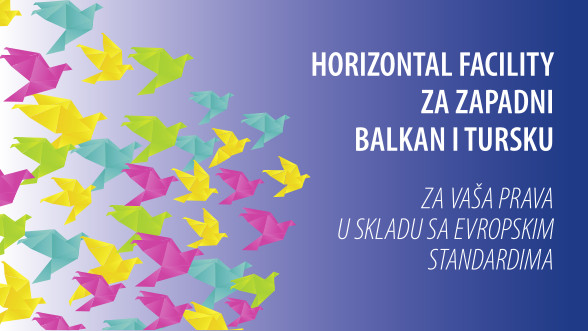Trafficking in human beings is a severe violation of human rights and only through joint action of all relevant actors - institutions, civil society and professionals, this phenomenon can be effectively countered. Preventing and combating trafficking in human beings remains one of the priorities of the Horizontal Facility II programme. Thus, 18 October – European Anti-Trafficking Day, is another reminder that this fight needs to remain guided by the European standards in this area, especially by the Convention on Action against Trafficking in Human Beings.
The Council of Europe’s Group of Experts on Action against Trafficking in Human Beings (GRETA) called on governments to counter technology-assisted human trafficking and to consider the best interests of victims when designing and using technological tools to combat trafficking in human beings. “Technology should be used to decrease the burden on the victims, for example in relation to investigations and prosecutions. The best interests of victims should be at the centre of any action”, said Helga Gayer, the President of Group of Experts on Action against Trafficking in Human Beings (GRETA), on the occasion of the European Anti-trafficking Day.
In the Western Balkans, Horizontal Facility II actions marked the European Anti-trafficking Day.
In co-operation with the Ministry of Security of Bosnia and Herzegovina (BiH) and the Ministry for Human Rights and Refugees of BiH, the joint European Union and Council of Europe action “Preventing and combating trafficking in human beings in Bosnia and Herzegovina” organised a round table to mark the European Anti-trafficking Day. “Trafficking for the purpose of labour exploitation is on the rise, even becoming the predominant form of exploitation in some countries. That is why, in recent years, the Council of Europe has been boosting its efforts towards combating this form of modern-day slavery”, said Bojana Urumova, Head of the Council of Europe Office in Sarajevo on this occasion.
An online panel discussion was organised in North Macedonia in co-operation with the Bureau for Development of Education to present some of the key achievements in the efforts to prevent and combat child trafficking. The discussion was attended by representatives of the Bureau, civil society organisation and experts on proactive identification and referral of children potential victims of child trafficking. Some of the education materials for teachers, primary and secondary school children and parents, prepared within the joint European Union and Council of Europe action “Preventing and combating human trafficking in North Macedonia“, were also shared during the panel discussion.
A digital platform intended for high school youth, called "How to protect yourself from human trafficking" was launched ahead of the European Anti-trafficking Day in Serbia. This platform was created by the civil society organisations Atina and the Child Rights Centre, within a grant awarded by the joint European Union and Council of Europe action “Preventing and combating trafficking in human beings in Serbia”. The platform offers answers to the most important questions about this problem: what is human trafficking, how to recognise a trafficker or a victim, what every young person can do to help a victim or his or herself in such a situation, whom to report a suspicion of human trafficking, how to protect yourself from human trafficking, and how to overcome the prejudices that accompany the phenomenon.
The Head of Department of the Directorate General of Migration Management (DGMM) of Turkey, Osman Koramaz, shared his views on ways to further increase the identification of victims of human trafficking and strengthen public awareness in Turkey. As he noted, strong national co-ordination, efficient public awareness raising, and thorough capacity building of frontline workers are essential for better identification of victims of trafficking in human beings. The European Union and the Council of Europe are working hand in hand with the authorities of Turkey through the joint action "Strengthening the human rights protection of migrants and victims of human trafficking in Turkey” towards these goals.
Strong partnership of the European Union and the Council of Europe and local actors, including beneficiary institutions and civil society organisations, remains the corner-stone of combating trafficking in human beings in the region, with the aim of better protecting victims of human trafficking, in line with European standards.


